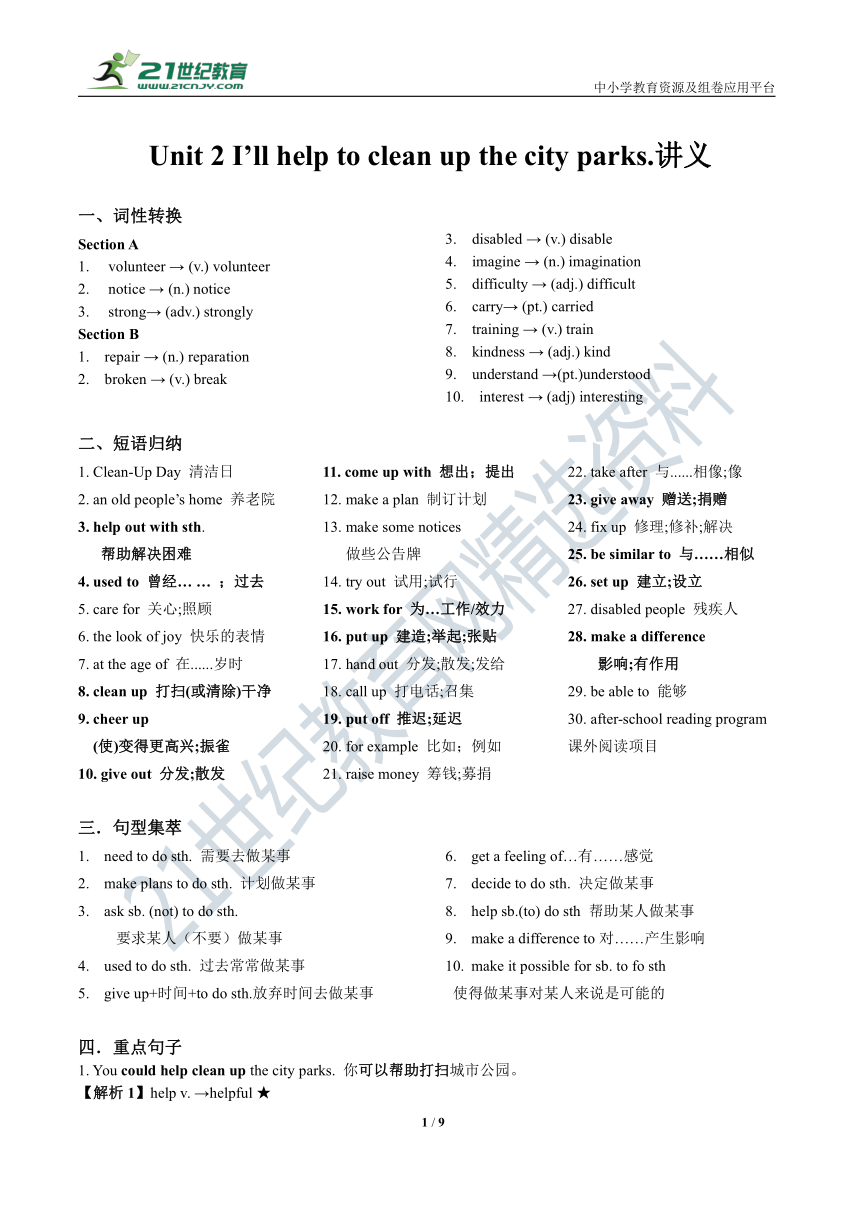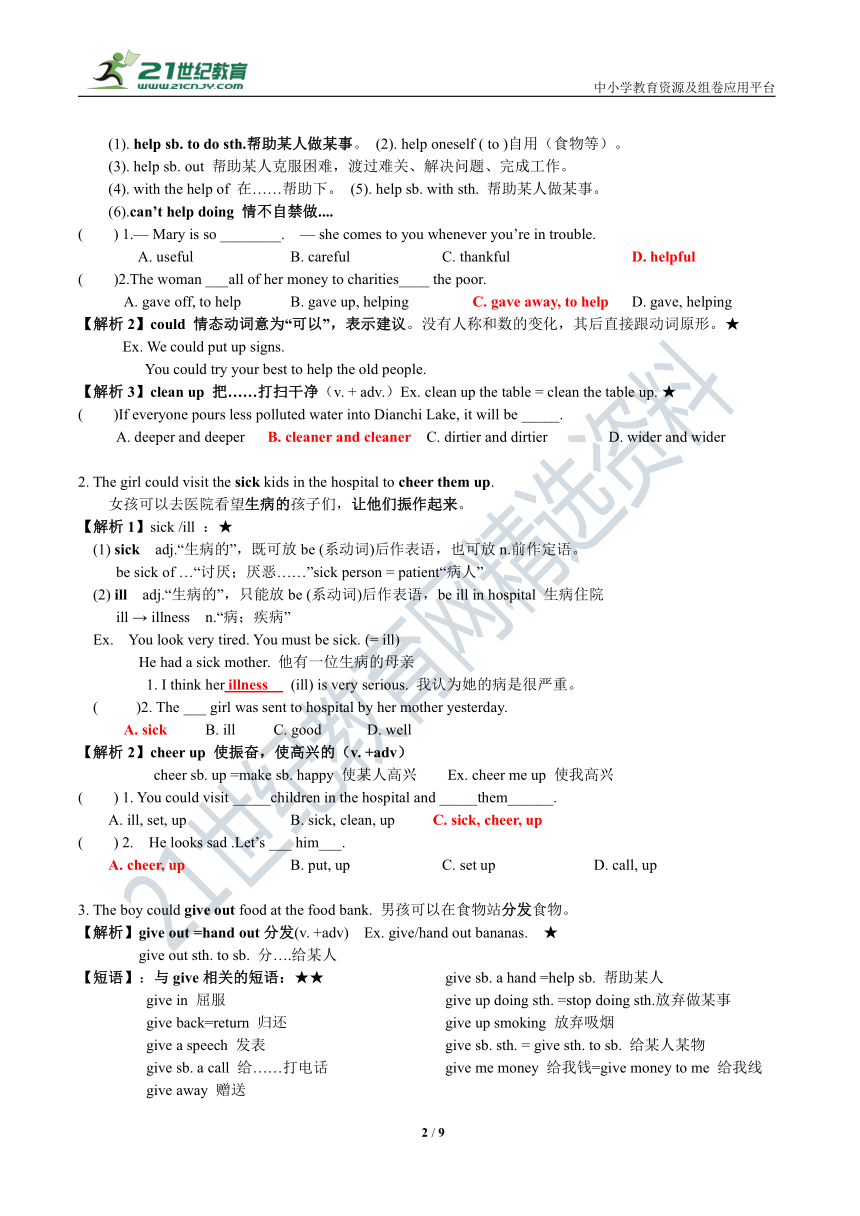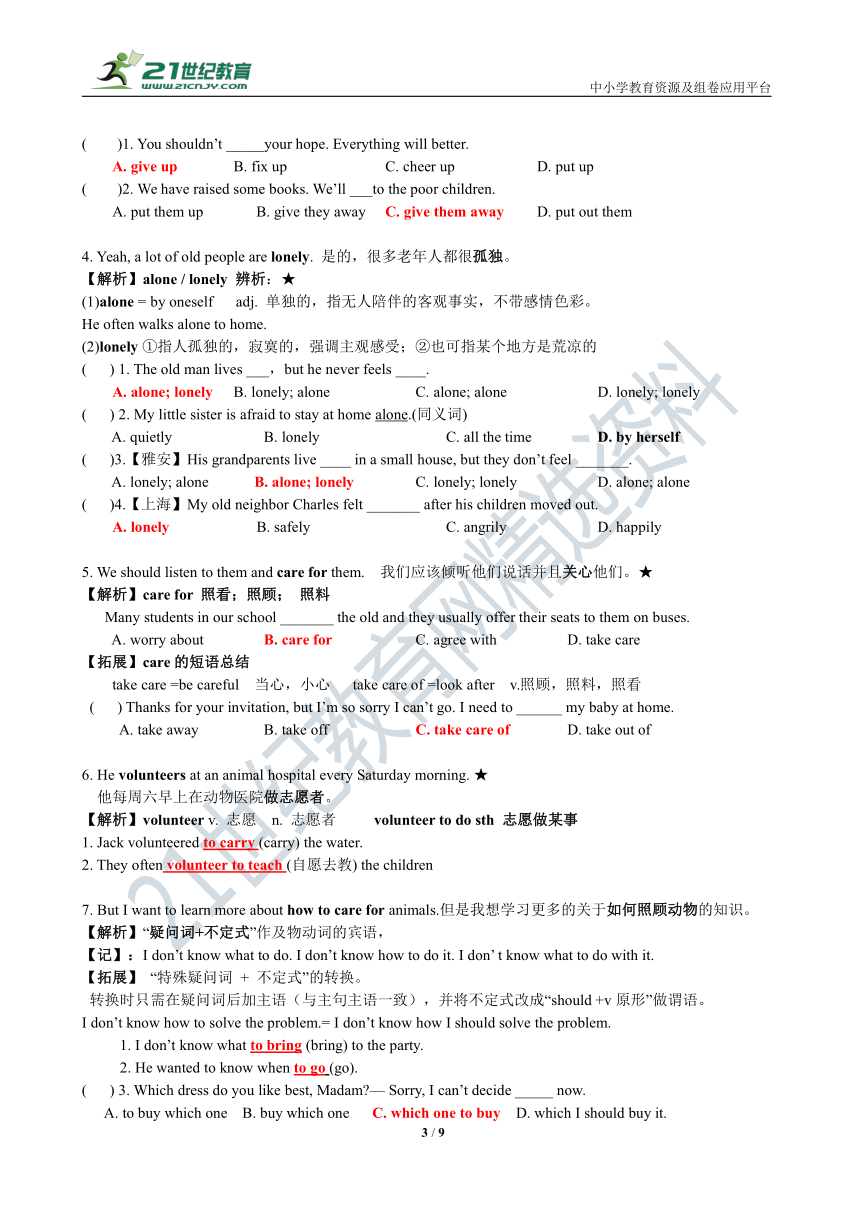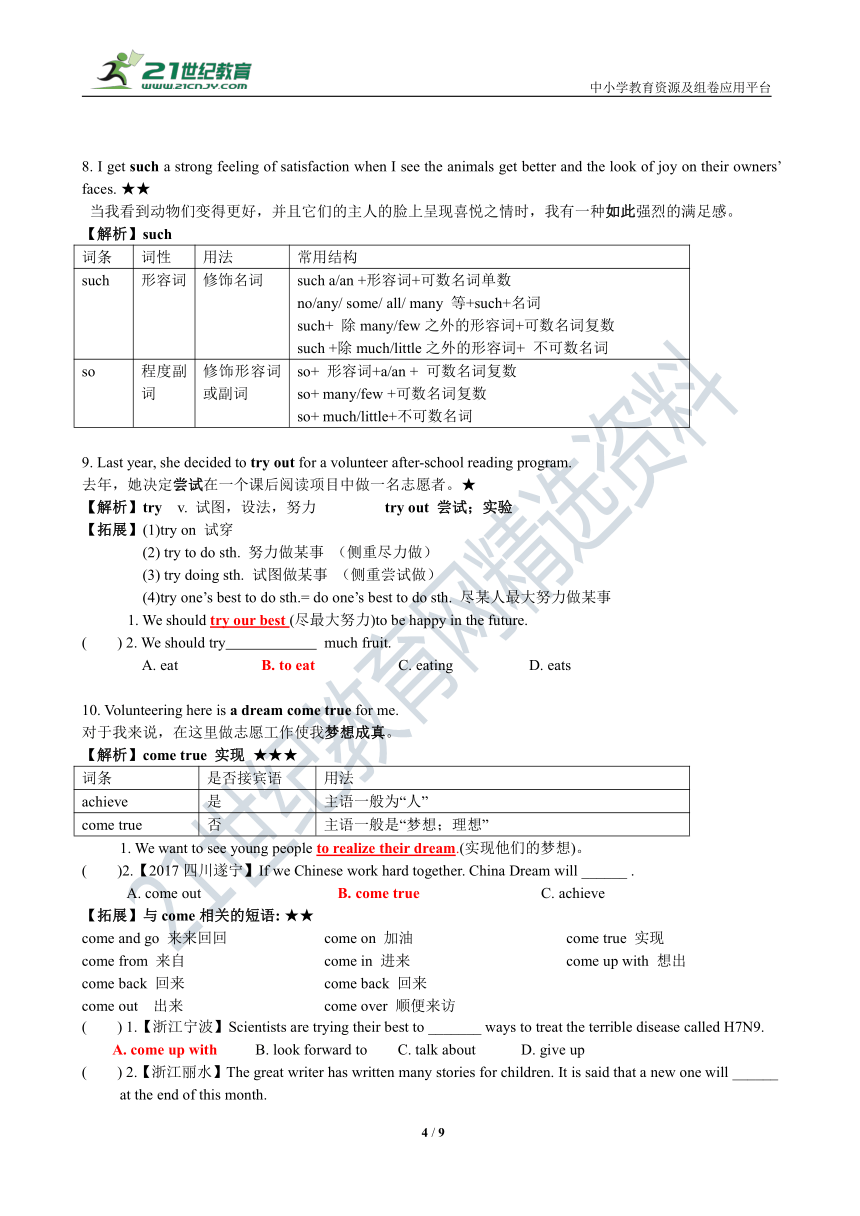Unit 2 I’ll help to clean up the city parks.单元知识点讲义
文档属性
| 名称 | Unit 2 I’ll help to clean up the city parks.单元知识点讲义 |  | |
| 格式 | zip | ||
| 文件大小 | 1.2MB | ||
| 资源类型 | 试卷 | ||
| 版本资源 | 人教新目标(Go for it)版 | ||
| 科目 | 英语 | ||
| 更新时间 | 2020-02-04 19:03:41 | ||
图片预览




文档简介
中小学教育资源及组卷应用平台
Unit 2 I’ll help to clean up the city parks.讲义
一、词性转换
Section A
1. volunteer → (v.) volunteer
2. notice → (n.) notice
3. strong→ (adv.) strongly
Section B
1. repair → (n.) reparation
2. broken → (v.) break
3. disabled → (v.) disable
4. imagine → (n.) imagination
5. difficulty → (adj.) difficult
6. carry→ (pt.) carried
7. training → (v.) train
8. kindness → (adj.) kind
9. understand →(pt.)understood
10. interest → (adj) interesting
二、短语归纳
1. Clean-Up Day 清洁日 2. an old people’s home 养老院
3. help out with sth.
帮助解决困难
4. used to 曾经… … ;过去
5. care for 关心;照顾 6. the look of joy 快乐的表情
7. at the age of 在......岁时 8. clean up 打扫(或清除)干净
9. cheer up
(使)变得更高兴;振雀 10. give out 分发;散发
11. come up with 想出;提出 12. make a plan 制订计划
13. make some notices
做些公告牌
14. try out 试用;试行
15. work for 为…工作/效力 16. put up 建造;举起;张贴
17. hand out 分发;散发;发给 18. call up 打电话;召集
19. put off 推迟;延迟 20. for example 比如;例如
21. raise money 筹钱;募捐 22. take after 与......相像;像
23. give away 赠送;捐赠 24. fix up 修理;修补;解决
25. be similar to 与……相似 26. set up 建立;设立
27. disabled people 残疾人 28. make a difference
影响;有作用
29. be able to 能够 30. after-school reading program课外阅读项目
三.句型集萃
need to do sth. 需要去做某事
make plans to do sth. 计划做某事
ask sb. (not) to do sth.
要求某人(不要)做某事
used to do sth. 过去常常做某事
give up+时间+to do sth.放弃时间去做某事
get a feeling of…有……感觉
decide to do sth. 决定做某事
help sb.(to) do sth 帮助某人做某事
make a difference to对……产生影响
make it possible for sb. to fo sth
使得做某事对某人来说是可能的
四.重点句子
1. You could help clean up the city parks. 你可以帮助打扫城市公园。
【解析1】help v. →helpful ★
(1). help sb. to do sth.帮助某人做某事。 (2). help oneself ( to )自用(食物等)。
(3). help sb. out 帮助某人克服困难,渡过难关、解决问题、完成工作。
(4). with the help of 在……帮助下。 (5). help sb. with sth. 帮助某人做某事。
(6).can’t help doing 情不自禁做....
( ) 1.— Mary is so ________. — she comes to you whenever you’re in trouble.
A. useful B. careful C. thankful D. helpful
( )2.The woman ___all of her money to charities____ the poor.
A. gave off, to help B. gave up, helping C. gave away, to help D. gave, helping
【解析2】could 情态动词意为“可以”,表示建议。没有人称和数的变化,其后直接跟动词原形。★
Ex. We could put up signs.
You could try your best to help the old people.
【解析3】clean up 把……打扫干净(v. + adv.)Ex. clean up the table = clean the table up. ★
( )If everyone pours less polluted water into Dianchi Lake, it will be _____.
A. deeper and deeper B. cleaner and cleaner C. dirtier and dirtier D. wider and wider
2. The girl could visit the sick kids in the hospital to cheer them up.
女孩可以去医院看望生病的孩子们,让他们振作起来。
【解析1】sick /ill :★
(1) sick adj.“生病的”,既可放be (系动词)后作表语,也可放n.前作定语。
be sick of …“讨厌;厌恶……”sick person = patient“病人”
(2) ill adj.“生病的”,只能放be (系动词)后作表语,be ill in hospital 生病住院
ill → illness n.“病;疾病”
Ex. You look very tired. You must be sick. (= ill)
He had a sick mother. 他有一位生病的母亲
1. I think her illness (ill) is very serious. 我认为她的病是很严重。
( )2. The ___ girl was sent to hospital by her mother yesterday.
A. sick B. ill C. good D. well
【解析2】cheer up 使振奋,使高兴的(v. +adv)
cheer sb. up =make sb. happy 使某人高兴 Ex. cheer me up 使我高兴
( ) 1. You could visit _____children in the hospital and _____them______.
A. ill, set, up B. sick, clean, up C. sick, cheer, up
( ) 2. He looks sad .Let’s ___ him___.
A. cheer, up B. put, up C. set up D. call, up
3. The boy could give out food at the food bank. 男孩可以在食物站分发食物。
【解析】give out =hand out分发(v. +adv) Ex. give/hand out bananas. ★
give out sth. to sb. 分….给某人
【短语】:与give相关的短语:★★
give in 屈服
give back=return 归还
give a speech 发表
give sb. a call 给……打电话
give away 赠送
give sb. a hand =help sb. 帮助某人
give up doing sth. =stop doing sth.放弃做某事
give up smoking 放弃吸烟
give sb. sth. = give sth. to sb. 给某人某物
give me money 给我钱=give money to me 给我线
( )1. You shouldn’t _____your hope. Everything will better.
A. give up B. fix up C. cheer up D. put up
( )2. We have raised some books. We’ll ___to the poor children.
A. put them up B. give they away C. give them away D. put out them
4. Yeah, a lot of old people are lonely. 是的,很多老年人都很孤独。
【解析】alone / lonely 辨析:★
(1)alone = by oneself adj. 单独的,指无人陪伴的客观事实,不带感彩。
He often walks alone to home.
(2)lonely ①指人孤独的,寂寞的,强调主观感受;②也可指某个地方是荒凉的
( ) 1. The old man lives ___,but he never feels ____.
A. alone; lonely B. lonely; alone C. alone; alone D. lonely; lonely
( ) 2. My little sister is afraid to stay at home alone.(同义词)
A. quietly B. lonely C. all the time D. by herself
( )3.【雅安】His grandparents live ____ in a small house, but they don’t feel _______.
A. lonely; alone B. alone; lonely C. lonely; lonely D. alone; alone
( )4.【上海】My old neighbor Charles felt _______ after his children moved out.
A. lonely B. safely C. angrily D. happily
5. We should listen to them and care for them. 我们应该倾听他们说话并且关心他们。★
【解析】care for 照看;照顾; 照料
Many students in our school _______ the old and they usually offer their seats to them on buses.
A. worry about B. care for C. agree with D. take care
【拓展】care的短语总结
take care =be careful 当心,小心 take care of =look after v.照顾,照料,照看
( ) Thanks for your invitation, but I’m so sorry I can’t go. I need to ______ my baby at home.
A. take away B. take off C. take care of D. take out of
6. He volunteers at an animal hospital every Saturday morning. ★
他每周六早上在动物医院做志愿者。
【解析】volunteer v. 志愿 n. 志愿者 volunteer to do sth 志愿做某事
1. Jack volunteered to carry (carry) the water.
2. They often volunteer to teach (自愿去教) the children
7. But I want to learn more about how to care for animals.但是我想学习更多的关于如何照顾动物的知识。
【解析】“疑问词+不定式”作及物动词的宾语,
【记】:I don’t know what to do. I don’t know how to do it. I don’ t know what to do with it.
【拓展】 “特殊疑问词 + 不定式”的转换。
转换时只需在疑问词后加主语(与主句主语一致),并将不定式改成“should +v原形”做谓语。
I don’t know how to solve the problem.= I don’t know how I should solve the problem.
1. I don’t know what to bring (bring) to the party.
2. He wanted to know when to go (go).
( ) 3. Which dress do you like best, Madam?— Sorry, I can’t decide _____ now.
A. to buy which one B. buy which one C. which one to buy D. which I should buy it.
8. I get such a strong feeling of satisfaction when I see the animals get better and the look of joy on their owners’ faces. ★★
当我看到动物们变得更好,并且它们的主人的脸上呈现喜悦之情时,我有一种如此强烈的满足感。
【解析】such
词条 词性 用法 常用结构
such 形容词 修饰名词 such a/an +形容词+可数名词单数 no/any/ some/ all/ many 等+such+名词 such+ 除many/few之外的形容词+可数名词复数 such +除much/little之外的形容词+ 不可数名词
so 程度副词 修饰形容词或副词 so+ 形容词+a/an + 可数名词复数 so+ many/few +可数名词复数 so+ much/little+不可数名词
9. Last year, she decided to try out for a volunteer after-school reading program.
去年,她决定尝试在一个课后阅读项目中做一名志愿者。★
【解析】try v. 试图,设法,努力 try out 尝试;实验
【拓展】(1)try on 试穿
(2) try to do sth. 努力做某事 (侧重尽力做)
(3) try doing sth. 试图做某事 (侧重尝试做)
(4)try one’s best to do sth.= do one’s best to do sth. 尽某人最大努力做某事
1. We should try our best (尽最大努力)to be happy in the future.
( ) 2. We should try much fruit.
A. eat B. to eat C. eating D. eats
10. Volunteering here is a dream come true for me.
对于我来说,在这里做志愿工作使我梦想成真。
【解析】come true 实现 ★★★
词条 是否接宾语 用法
achieve 是 主语一般为“人”
come true 否 主语一般是“梦想;理想”
1. We want to see young people to realize their dream.(实现他们的梦想)。
( )2.【2017四川遂宁】If we Chinese work hard together. China Dream will ______ .
A. come out B. come true C. achieve
【拓展】与come相关的短语: ★★
come and go 来来回回
come from 来自
come back 回来
come out 出来
come on 加油
come in 进来
come back 回来
come over 顺便来访
come true 实现
come up with 想出
( ) 1.【浙江宁波】Scientists are trying their best to _______ ways to treat the terrible disease called H7N9.
A. come up with B. look forward to C. talk about D. give up
( ) 2.【浙江丽水】The great writer has written many stories for children. It is said that a new one will ______ at the end of this month.
A. go out B. come out C. look out D. run out
11. However, few people think about what they can do to help others.
然而,很少有人会考虑他们能做些什么来帮助他人。★★
【解析】few 几乎没有
词条 含义 修饰的名词的数 例句
few 几乎没有(表否定含义) 可数名词复数 They know few of us
a few 一些(表肯定含义) He made a few mistakes
little 几乎没有(表否定含义) 不可数名词 I spend very little on food
a little 一些(表肯定含义) I know a little about the story
【注】 a few/ few
(1) a few, few 用来修饰可数名词。
(2) a few “有一些”,表示肯定概念; few 几乎没有,表示否定意义。
Ex. The man has been here for many years, so he has a few friends.
这个人在这里住了很多年了,他有一些朋友。
I am a new comer here, so I have few friends here. 我刚来到这里,所以我在这里没有几个朋友。
【注】a little/ little
(1) a little, little 用于修饰不可数名词。
(2) a little “有一些”,表示肯定概念。 little “几乎没有”,表示否定概念。
Ex. There is a little water in the glass.杯子里有一些水。
There is little water in the glass, so you can’t drink any. 杯子里几乎没有水了,你不可能喝到水了。
( )1.—There used to be lots of fish in the lake.
— Yes, but there are very __________ now.
A. few B. fewer C. little D. Less
( )2. The girl in purple is new here, so ___ people know her.
A. few B .a few C .a little
12. I take after my mother. 我长的像我妈妈。
【解析】(1)take after =be similar to在(外貌、性格等方面)与(父母)相像(v. +adv)
【拓展】与take相关的短语:
take back 收回,接回 take down 写下 take off 脱下;起飞
take up 占去(时间或空间)take care 小心 take care of 照顾
take place 发生 take out 拿出 take away 拿走
(2)look like 只指在外貌上与…..相像
【拓展】:look after 照顾 look up 向上看,查找 look for 寻找 look out 小心
( ) 1.The girl _____ the woman. Maybe she is her daughter.
A. take care B. takes after C. takes off D. look after
( ) 2.【山东青岛】Tom ___ his father, because they both are cheerful and easygoing.
A. looks like B. takes after C. doesnt’ take after D. isn’t like
13. I was able to bring him home. 我可以把它带回家了。★
【解析】 be able to 与can辨析:
词条 适用时态 人称和数 例句
be able to 用于各种时态 有人称和数的变化 I will be able to dress more casually.
can 用于现在时或过去时(could) 没有人称和数的变化 I could swim at the age of seven. =I was able to swim at the age of seven.
14. For example, I say, “Lucky! Get my book,” and he does it at once.
例如, 我说:“Lucky!把我的书拿来。” 它马上就照做。
【解析】(1)fetch v. 去拿来=get 去(某地) 拿来(讲话者处)★★★
(2)bring v. 带来从(某地)拿到(讲话者处)
bring up 养育,养大 bring sb. sth = bring sth to sb. 给某人带某物
(3)take v. 带来, 从(讲话者)拿走take →took → taken
【拓展】 与take有关的短语:
take care 小心
take charge of 负责,看管
take off 脱下
take out 取出
take a look 看一看
take away 拿走
take exercise 做运动
take it easy 不紧张
( ) 1.—Sam, my iPhone is in my bedroom. Could you _____ it for me?
—No problem.
A. bring B. fetch C. take D. carry
( ) 2.—I’ve left my keys in the meeting room. Please ___them for me.
—All right.
A. buy B. paint C. wash D. fetch
15. I’ll send you a photo of him if you like, and I could show you how he helps me.
如果你喜欢我会给你寄张他的照片,并且我会告诉你他是如何帮助我的。
【解析1】send→ sent → sent v. 发送
【拓展】: 与send 有关的短语:★★
send away 赶走
send for 派人去请
send off 寄出
send out 分发
send up 发射
send sb. sth = send sth to sb.
送给某人某物
( ) 1. You fill in both parts of the form, then_____.
A. send up it B. send for it C. send it away D. send it off
( ) 2. Please send a photo of your family ____ me.
A. for B. at C. to D. with
【解析2】if引导真实条件状语从句从句用一般现在时,主句用一般将来时。★
( )1.The children will climb the hill if it___________ tomorrow.
A. won't rain B. didn't rain C. isn't raining D. doesn't rain
( )2. If Nancy ______ the exam, she will go to Australia for English study.
A. pass B. passed C. passes D. will pass
五.重点语法
动词不定式
原文再现:
But I want to learn more about how to care for animals.
但是我想学习更多的关于如何照顾动物的知识。
The girl could visit the sick kids in the hospital to cheer them up。
女孩可以去医院看望生病的孩子们,让他们振作起来。
(1) 动词不定式结构:to+动词原形,有时不带to。 to为动词不定式的符号,本身无意义,没有人称和数的变化。
(2) 动词不定式在句中充当主语、宾语、宾语补足语、定语和状语等。初中要掌握的用法如下:
句法作用 例句
做宾语 He wants to buy a car.
做状语 She went to see her teacher.
做宾语补足语 Lily helps me to finish the work.
【注意】在want, like, agree, hope, wish, learn, begin, start, seem, decide, hate, choose, forget, remember等动词后面,可以接不定式作宾语。
在ask, teach, expect, tell, allow等动词可接不定式作宾语补足语。
在go, come, try, do/try one's best等动词或短语动词作谓语时,其后常常可以接不定式作目的状语。
"be +形容词+ to do sth"结构中的不定式作状语,常表示原因或方式。
(3) 动词不定式的否定形式:not to do
Ex. We decided not to visit Beijing.
Ex. My mother asks me not to play computer games everyday.
(4) 动词不定式可以喝特殊疑问词连用(what/which/how/where/when/which等)。
Ex. I don’t know how to solve the problem.= I don’t know how I should solve the problem.
(5) 不带to的情况:感官动词和使役动词后用作宾语补足语的不定式通常不带to.
① 感官动词:see/hear/watch/feel/notice + do
② 使役动词:let/make/have + do
Ex. I see him come into the house.
I heard the bird sing.
Please let me go.
He always makes her cry.
六.真题演练
( )1.【山西省】He wants ______ some vegetables.
A. buy B. buying C. to buy D. buys
( )2.【福建省】Don't forget ______ your homework with you when you come to school.
A. to bring B. bringing C. to take D. taking
( )3.【湖南省】He found it very difficult ______.
A. sleeping B. sleeps C. slept D. to fall asleep
( )4.【河北省】I'm sorry ______ that.
A. hears B. hearing C. hear D. to hear
( )5.【吉林省】 I'm sorry ______ you.
A. trouble B. to trouble C. troubling D. troubled
( )6.【甘肃省】My mother was very glad ______ her old friend.
A. to meet B. meet C. met D. meets
( )7.【江西省】She went ______ her teacher.
A. to see B. looks C. saw D. seeing
( )8.【四川省】Meimei likes English very much. She does her best ______ English well.
A. learn B. learning C. to learn D. learns
( )9.【河南省】We saw him ______ the building and go upstairs.
A. to enter B. enter C. entering D. entered
( )10.【吉林省】 So much work usually makes them ______ very tired.
A. to feel B. feels C. feeling D. feel
68 / 122
同课章节目录
- Unit 1 What's the matter?
- Section A
- Section B
- Unit 2 I'll help to clean up the city parks.
- Section A
- Section B
- Unit 3 Could you please clean your room?
- Section A
- Section B
- Unit 4 Why don't you talk to your parents?
- Section A
- Section B
- Unit 5 What were you doing when the rainstorm came
- Section A
- Section B
- Review of Units 1-5
- Unit 6 An old man tried to move the mountains.
- Section A
- Section B
- Unit 7 What's the highest mountain in the world?
- Section A
- Section B
- Unit 8 Have you read Treasure Island yet?
- Section A
- Section B
- Unit 9 Have you ever been to a museum?
- Section A
- Section B
- Unit 10 I've had this bike for three years.
- Section A
- Section B
